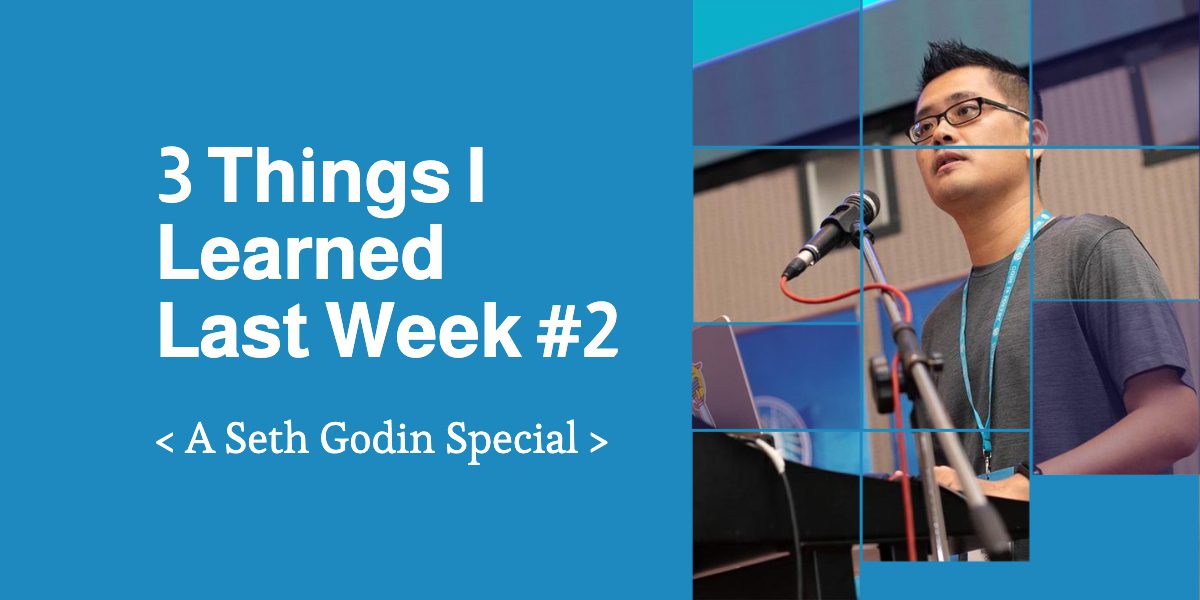Welcome to my weekly newsletter, where I share three things I learned last week.
Every week, I consume various media, including articles, books, podcasts, YouTube videos, online courses, and more, to stay informed and continuously improve my knowledge and skills.
I share my learning journey's most exciting and insightful takeaways in this newsletter. Please feel free to forward this along to friends.“Many people fall into the illusion that whatever they’re creating is for everybody, and as a result, their work suffers.” ~ Seth Godin
1. Being Meaningful Specifics
The YouTube Video I Watched: # How To GET STARTED, GET UNSTUCK & SHARE Your Best Work | Rich Roll Podcast
It’s important to focus on the things that matter in our life and make them the best. To do this, we must say ‘no’ to many attractive things that don’t push us forward, like trying to argue with anonymous trolls just so we can feel the “winning.”
Don’t listen to what people say about you because it won’t help you improve. It’s also not a good idea to make something for everyone, as it won’t have much impact.
Instead, focus on creating something for a specific group of people. In other words, being meaningful specifics. And if they don’t like it – don’t worry, you can always try again. If you try hard enough, you’ll get a lucky break eventually.
“People who are willing to do the hard work are the ones who are toiling with no obvious applause, who are doing something that doesn’t make the crowd happy in the short run, who are confronting things that feel risky because they understand that over time they’re not risky. They’re actually generous and useful.” ~ Seth Godin
2. The Difference Between Hard Work and Long Work
The YouTube Video I watched: The Tim Ferriss Show – Seth Godin on How to Say No, Market Like a Professional, and Win at Life
Main Takeaways
Hard work requires emotional labor, risk, and generosity, while long work involves putting in extra hours for a task.
Real-life examples of choosing hard work over long work can be seen in the STEM field. Instead of churning out papers and long hours of research, engineers often think of ways to make their work more efficient and develop innovative solutions that solve their problems quicker.
As another example, entrepreneurs often choose hard work over long work by taking risks that may not pay off, but in the end, those risks often lead to growth and success in the venture they are pursuing.
To make the decision to do hard work, it is necessary to understand what is not worth pursuing and then focus on what is worth pursuing.
It is also essential to have an attitude of gratitude and willingness to serve and give of one’s time and resources. This can result in more meaningful work and more fruitful results than simply putting in extra hours without any thought or plan.
Hard work pays off in the long run and can bring shifts in those who engage with it.
Public education was built to train kids to sit still long enough to work in a factory. But instead of teaching kids how to solve interesting problems and how to lead, we’re teaching them how to do well on the test.
3. The education system should encourage students to work on their problem-solving and creativity
The YouTube Video I watched: Seth Godin – Education Reform
Main Takeaways
Schools are still operating very similarly to how they did 100 years ago, yet the world has changed drastically in that time. We need to adjust how schools are run so that students are better equipped for the challenges of tomorrow.
This means shifting away from outdated methods of measuring and memorization and instead focusing on fostering problem-solving skills and creativity. Technologies such as smartphones, the internet, and chatGPT have enabled anyone to access knowledge from anywhere in the world, but that’s only the first step. Colleges and universities must also reevaluate the role and cost of their education to ensure that it prepares students to think critically and solve problems in an ever-evolving world.
We must also create an environment that encourages risk-taking and experimentation. Making mistakes is an integral part of growth, and we should empower students to take chances and develop solutions, not just memorize facts. By teaching problem-solving and creativity, we can equip students with the skills they need to navigate their future.
Thank you for joining me on this weekly learning journey. I hope you found the three things I shared insightful and valuable. Remember, continuous learning is essential for personal and professional growth, and I’m honored to be a part of your learning process.
I wish you a great week filled with new opportunities, growth, and joy.
And if you received this newsletter forwarded by a friend, subscribe to get your own copy every week. Just click the link below and enter your email address, and you’ll be all set.
Subscribe here: https://www.nathanonn.com/newsletter/
Thank you for being so supportive, and I’ll see you next week with more exciting insights to share!
Best regards,
~ Nathan

Leave a Reply